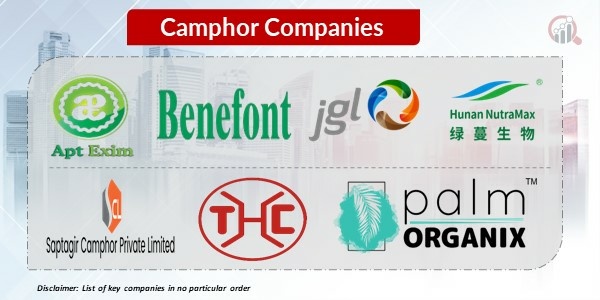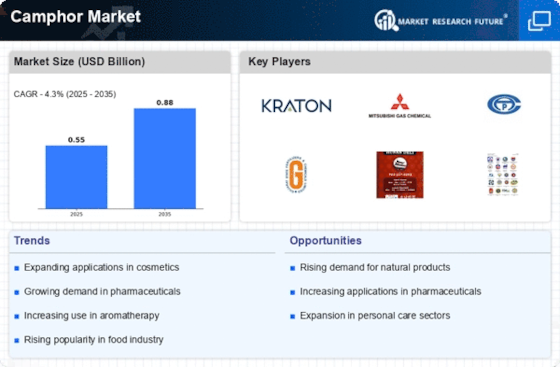Top Industry Leaders in the Camphor Market

Camphor, a versatile terpene compound derived from various sources like camphor laurel trees and thyme, finds application across diverse industries including pharmaceuticals, food & beverages, cosmetics, and more. While the global camphor market is projected to reach a value of USD 0.74 billion by 2032
Strategies for Success:
Competition in the camphor market is fierce, and success hinges on adopting effective strategies. Here are some key approaches:
-
Focus on Quality and Sustainability: Natural camphor commands a premium due to its perceived benefits and sustainability concerns surrounding synthetic production. Players like Mangalam Organics emphasize sustainable sourcing practices to attract eco-conscious consumers. -
Product Differentiation: Offering unique formulations or value-added products can help stand out in a crowded market. For example, Tekho Camphor Co. Ltd. offers various grades of camphor tailored to specific applications. -
Cost Competitiveness: Synthetic camphor is generally cheaper than its natural counterpart. Players like Benefont focus on efficient production processes to offer cost-effective solutions. -
Expanding Distribution Channels: Reaching new customers is crucial for market share growth. Players are actively expanding their online presence and exploring international markets. -
Strategic Partnerships and Collaborations: Collaboration can help overcome resource limitations and access new markets. For instance, Kanchi Karpooram has partnered with research institutions to develop innovative camphor-based products.
Factors Influencing Market Share:
Several factors influence market share in the camphor market:
-
Production Capacity and Efficiency: Players with larger production capacities and efficient processes have a cost advantage, making them more competitive. -
Brand Reputation and Trust: Established brands with a strong reputation for quality and reliability often command higher prices and customer loyalty. -
Geographical Reach and Distribution Network: Wider distribution networks and access to diverse markets translate to larger customer bases and higher market share. -
Compliance with Regulations: Strict adherence to quality and safety regulations assures customers and builds trust, leading to market share gains. -
Product Innovation and Diversification: Offering innovative products and diversifying product portfolios attracts new customers and expands market reach.
Key Companies in the camphor market include
-
Apt Exim
-
Beijing Herbal Health Biotech LLC
-
Benefont
-
Camphor & Allied Products Ltd.
-
adran Galenski Laboratorij
-
Hunan Nutramax Inc.
-
Saptagir Camphor Ltd.
-
Taiwan Tekho Camphor Co., Ltd
-
Mother Sparsh
-
Palm Organix Company
Recent Developments
August 2023:
- Increased Demand from Pharmaceuticals: Growing demand for camphor-based topical pain relievers in emerging markets drives market growth.
- Sustainable Camphor Initiatives: Mangalam Organics partners with NGOs to promote sustainable camphor tree harvesting practices in India.
September 2023:
- New Synthetic Camphor Production Unit in China: Suzhou Youhe Science and Technology Co., Ltd. announces plans to expand its synthetic camphor production capacity.
- Regulatory Changes in Europe: New EU regulations tighten restrictions on the use of certain synthetic camphor derivatives in cosmetics.
October 2023:
- Camphor Price Hike: Rising raw material costs and supply chain disruptions lead to a global increase in camphor prices.
- Focus on Research & Development: Major players invest in R&D to develop new camphor-based products and applications.
November 2023:
- E-commerce Boom: Rising online sales of camphor-based products like essential oils and topical ointments benefit market players with strong online presence.
- Focus on Sustainability: The Camphor & Allied Products Association organizes a workshop on sustainable camphor production practices.










